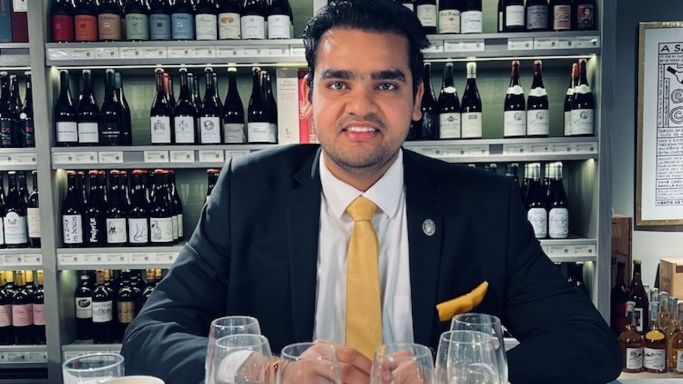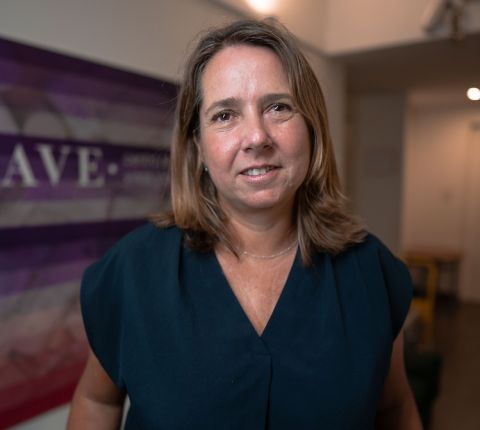Romané Basset of the Gérard Basset Foundation continues this series profiling some of the most impressive applicants for this year's Taylor's Port Golden Vines Awards, a mix of funds and internships for MW and MS candidates. See part 1.
Harnil Mathur, India
Mathur is pictured at the top of this article. His first exposure to wine came in 2015 when he started a Bachelor’s degree in hospitality and hotel administration. After graduating he ‘decided to dive in head-first’ and enrolled at the Court of Master Sommeliers. He passed both the Introductory and Certified exams on his first attempt in 2018 and became the youngest candidate to pass them in India up to that point, being only 20 years old at the time.
By the age of 24, he had progressed to the Advanced Sommelier certification, becoming only one of three people in India to achieve this, going on to gain the Wine Scholar Guild’s French Wine Scholar Diploma with the highest honours, and following this up with his WSET Level 3, passing with Merit. He went on to attain Gold in the ASI Sommelier Diploma. Having just completed an MBA in wine and spirits business at the Burgundy School of Business, he is now beginning to prepare himself for full Master Sommelier certification. In this year’s Best Sommelier of India competition, he came an impressive second place, and since finishing his MBA has gone on to become the head sommelier of Black Sheep Restaurants in Hong Kong.
Flavia Rizzuto, Argentina
Rizzuto’s wine journey has spanned three decades, and began in the on-trade, working as a sommelier in hotels and restaurants. In 2002, she made history by winning the inaugural Best Sommelier of Argentina competition, and then in 2004 she represented Argentina at the ASI World’s Best Sommelier competition in Athens, Greece.
Following this, after 17 years working on the restaurant floor, Rizzuto decided to pivot her career and devote herself to teaching and education in the wine and sommelier fields. She loves imparting knowledge and enabling others to learn, but found that it is challenging to access international certifications in Argentina, where the choice of non-Argentine wines can be extremely limited.
Not one to be easily deterred, Rizzuto set herself the task of rectifying this, and in 2008 she succeeded in getting her school, CAVE (Centro Argentino de Vinos y Espirituosas), registered as an official Approved Programme Provider of the WSET, a phenomenal achievement. Since then, Rizzuto and CAVE have offered students a three-year sommelier degree course, as well as Levels 2 and 3 of the WSET, with a view to offering the Diploma eventually as well.
Rizzuto not only loves to teach, but also adores learning and is currently at Stage 2 of the MW programme. She hopes by gaining the MW to ‘start a movement in Latin America that can network and contribute’ to enhancing the wine industry, both locally and globally.
Deniz Bayram, UK
Bayram is a wine educator of Turkish ancestry, teaching WSET Levels 1, 2 and 3 at their flagship school in London – a role that perfectly fits his desire to share knowledge with others. He is passionate in particular about the Eastern Mediterranean’s diverse wine offerings, which he feels represent ‘untapped potential’ given what he calls their ‘ancient viticultural legacy’. He is a constant advocate for ‘transforming international perceptions of these regions’.
To that end, in November 2023 Bayram organised a Wines of Mesopotamia event at the WSET School London. Sourcing wines from south-eastern Turkey, Syria and Iran – regions that are ‘fraught with armed conflict and civil unrest’ yet ‘rich with viticultural promise’ – he demonstrated to attendees not only the high quality of these wines, but also ‘the enduring spirit of minority groups striving to maintain their cultural heritage through viticulture’. Bayram aims to pursue the MW programme, which will allow him to promote interest in and support scholarly research into these regions, so as to increase global awareness of them. He wants to add to the global story of wine in all its varied forms and help prevent these fascinating wine cultures being consigned to history.


